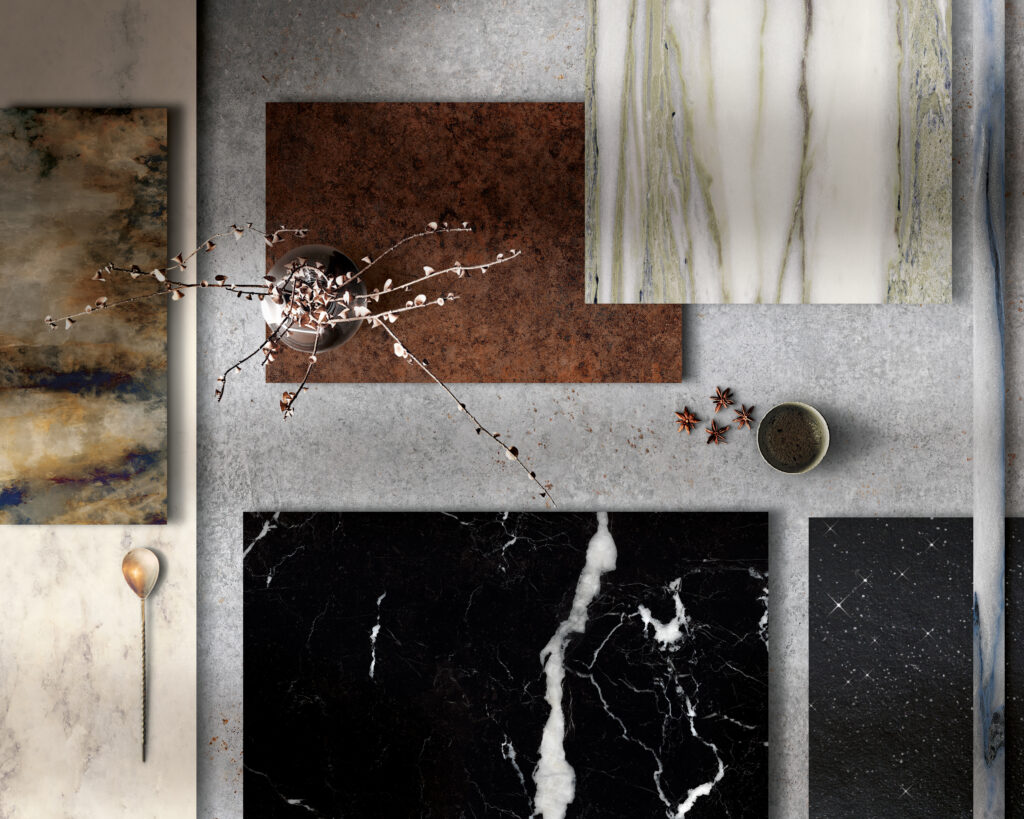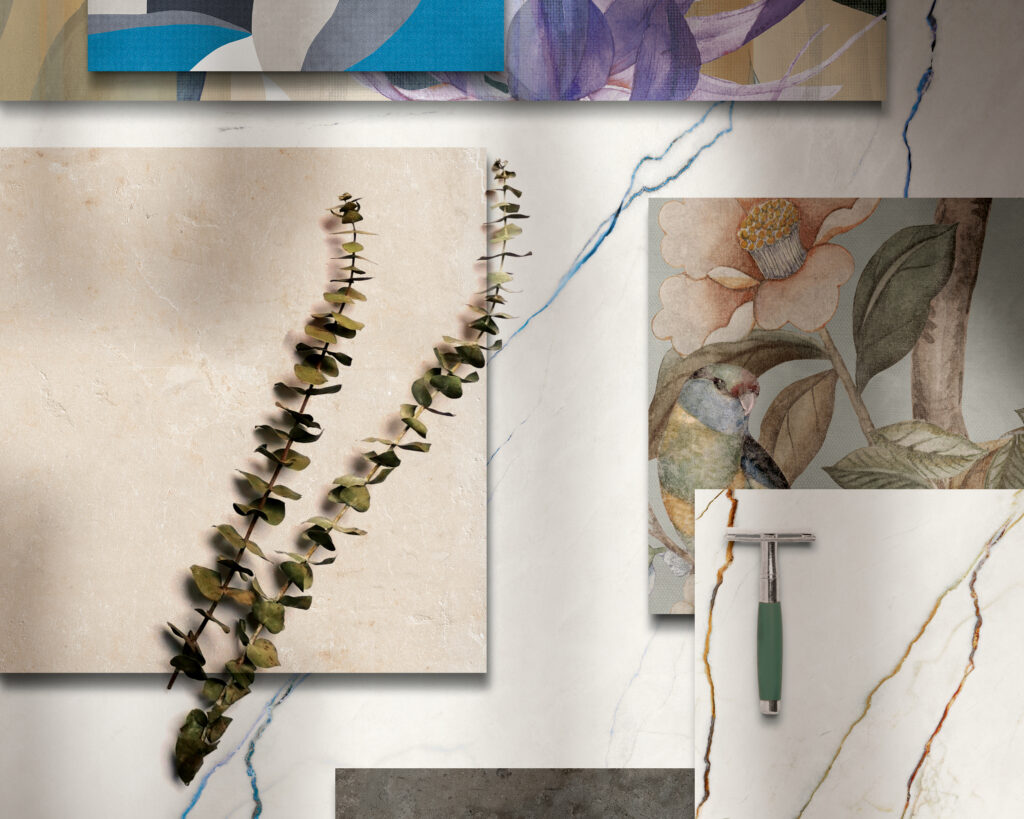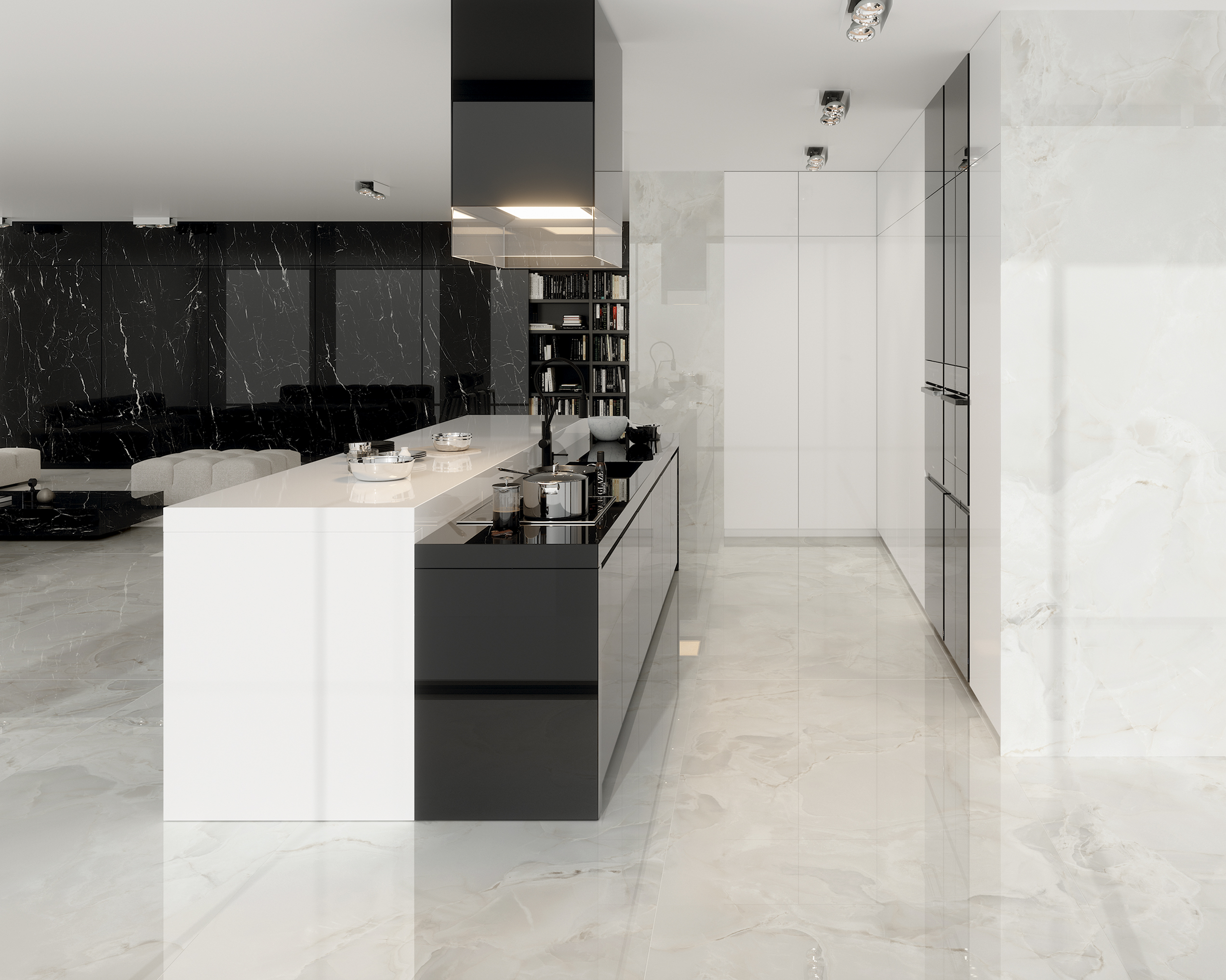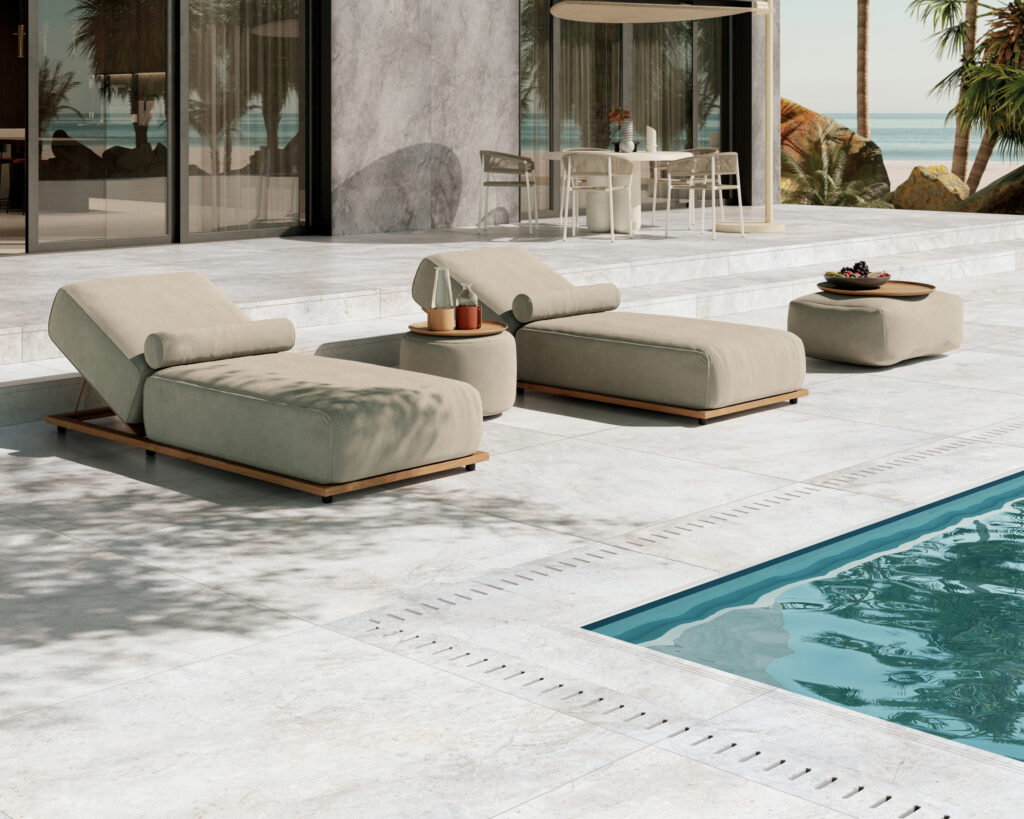Elegant, refined and versatile: porcelain stoneware changes the face of your home
Porcelain stoneware is an elegant, durable and extremely versatile material that is the perfect solution for the flooring and cladding of the interior and exterior spaces of your home. Regardless of the style you prefer and the aesthetic effects you intend to recreate, porcelain stoneware tiles are the ideal complement to allow you to achieve a result that is not only perfect from an aesthetic point of view, but also extremely resistant, safe and practical to handle in everyday life.
All this is made possible by specific technological solutions that allow, today, to obtain porcelain stoneware slabs of different sizes and thicknesses, capable of reproducing a wide range of natural materials ranging from marble to stone, passing through cement, metal, onyx and many others. Beauty, functionality and resistance are the characteristics that make this material perfect for changing the face of every home: whatever style you have in mind, porcelain stoneware can help you turn your dream home into reality.
Want to know more? Here’s everything you need to know about the characteristics of porcelain stoneware and its applications in interior design, to discover how to make the most of the great technical and aesthetic potential of this material.
- How porcelain stoneware is produced
- Why choose porcelain stoneware
- Installation, cleaning and maintenance of porcelain stoneware
- Designing with stoneware: a versatile material that enhances every style of furniture
- Stoneware for furniture: upholstery, furnishings and special pieces
1. How porcelain stoneware is produced
Porcelain stoneware is a ceramic material composed of clays, sands and small amounts of other high-quality components, such as feldspars, kaolins or silica. The mixture of these materials is ground and atomised with special mills to create an extremely fine powder and finally pressed and fired at high temperatures, ranging from 1200 to 1400 °C. The combination of extremely fine granulometry and high temperature initiates a process called “greification” (from which the word “gres” derives): the microgranules of matter are welded to each other, vitrifying and permanently modifying their chemical-physical structure.
This process means that, at the end of cooking, the material has unique characteristics:

Waterproof: porcelain stoneware is an extremely non-porous material, which is therefore impermeable to water; according to European regulations (EN 14411- ISO 13006), only ceramic products with a water absorption coefficient ≤ 0.5% can be called “porcelain stoneware”.

Abrasion resistant: the hardness of porcelain stoneware does not only make the material resistant to scratching, but also to abrasion, allowing it not to be damaged even if subjected to repeated contact and rubbing with other objects or materials.

Resistant to bending: porcelain stoneware is able to withstand high levels of tension without breaking.

Resistant to frost: porcelain stoneware resists frost, temperature changes and the impact of atmospheric agents, it’s an ideal material to be used also for the coating of outdoor spaces, because its characteristics mean that the structure of the tile is not damaged even when subjected to intense thermal stress, or the high presence of water.
The porcelain stoneware tiles, in addition to being technically performing, are also extremely refined from the aesthetic point of view, thanks to the current inkjet printing techniques that allow to obtain extremely realistic results from the point of view of colors, feel and texture. In addition, porcelain stoneware tiles are now available in a wide range of sizes and thicknesses: you can, therefore, choose large format slabs (160 x 320 cm, completely similar to the marble or granite slabs normally used in construction), or opt for smaller tiles, to be used to create particular laying effects. Also with regard to thicknesses, it is possible to range from ultra-thin slabs with athickness of just 6 mm, lightweight and ideal to be used for the coating of pre-existing floors, up to slabs of 20 mm or more in thickness, suitable for the production of tables and furnishing accessories or for the flooring of surfaces subjected to significant stress (environments open to the public, business areas, driveways).
2. Why choose porcelain stoneware
Thanks to its technical and aesthetic characteristics, porcelain stoneware is the perfect material to use in domestic environments, but also for the flooring of outdoor spaces, gardens and terraces or buildings open to the public.
The advantages guaranteed by the use of this material are truly countless:
- Porcelain stoneware reproduces the characteristics of the most beautiful and precious natural materials: thanks to the current evolution of printing technologies, porcelain stoneware is now a perfect substitute for countless natural materials traditionally used in construction, including stone, marble, wood, onyx and many others. At an aesthetic level, it is almost impossible to distinguish at first glance a stone-effect porcelain stoneware slab from a stone one, or a wood-effect porcelain stoneware tile from an original parquet, since all the veins, knots, roughness, shine and texture are reproduced with extreme precision.
- Porcelain stoneware does not require maintenance: as we have seen, the tiles obtained through the greasing process are able to withstand countless types of stresses excellently: they withstand important loads without breaking, they do not break if they are subjected to bending and their vitrified surface resists abrasion. This means that porcelain stoneware, once installed, does not require any type of maintenance, and that it retains its characteristics over time without the need to carry out special interventions to preserve its original appearance.
- It is easy to clean and sanitise: porcelain stoneware, thanks to its low porosity that makes it waterproof, is an extremely easy material to clean, because all the external agents that deposit on it are not absorbed by the tile, but remain on the surface. Wood is a living material, which changes physiologically over time, and marble is a material sensitive to the action of acids that can permanently ruin it: porcelain stoneware, on the other hand, is a stable material that is not damaged by liquids, fats or acids, and can be cleaned effortlessly using simple neutral detergents. In addition, porcelain stoneware, being water resistant, is a material that hinders the engraftment of molud, and can be easily disinfected to prevent the proliferation of potentially dangerous microorganisms and bacteria.
- Porcelain stoneware is an environmentally sustainable material: stoneware tiles, in fact, are produced through non-polluting processes that do not drastically impact the territory, unlike what a marble quarry does, for example. In addition, porcelain stoneware, being a good conductor of heat, can play an important role in reducing the energy consumption of a house: the use of porcelain stoneware tiles in combination with a floor heating system allows, in fact, to optimise the performance of the system and therefore reduce energy consumption and harmful emissions, with obvious advantages not only for the inhabitants of the house, but also for the environment.
3. Installation, cleaning and maintenance of porcelain stoneware
Porcelain stoneware, as we have seen, is a resistant and easy to clean material, which thanks to its waterproofing retains its aesthetic characteristics over time without the need for special maintenance.
To ensure that a porcelain stoneware floor remains beautiful and shiny for a long time, it is enough to remove the residues (dust, hair, animal hair…) deposited on its surface using a vacuum cleaner, a broom or a dustproof cloth, and then proceed to washing with warm water and ceramic floor cleaner. Alternatively, it is also possible to use simple ammonia, bleach or alcohol, all products that guarantee optimal results from the point of view of hygiene and cleaning and that can be used in small quantities (excessive use of detergent, on the contrary, risks producing halos and therefore be counterproductive). Washing can be carried out with a simple soft cloth, without the use of brushes or other abrasive tools, and does not require the use of any additives, waxes or other polishing products.
It is important to remember that these indications apply to any type of stoneware, regardless of its texture or finish: both smooth and rough tiles, both glossy and opaque, both wooden effect and stone effect require the same type of interventions. This means that, regardless of the style of your home and the type of tile chosen, all porcelain stoneware floors can be washed easily and frequently, obtaining excellent results from the point of view of hygiene, as well as aesthetics and functionality.
There is only one time when porcelain stoneware floors require a more thorough cleaning intervention, which is usually carried out by experienced professionals: it is the first cleaning immediately after laying the tiles. The laying of porcelain stoneware, in fact, involves the use of special adhesive glues or cement mortar that must be applied on a smooth and planar screed, on which the stoneware slabs then rest. Once the tiles have been laid and the grouting of the joints has been carried out, it is necessary to proceed with a first washing of the tiled surface using a special acid-based detergent diluted in water.
The liquid must be left to act for a few minutes and then carefully removed with clean lukewarm water or with special vacuum-water machines, which allow you to obtain a much more accurate result in less time and with less effort.
4. Designing with stoneware: a versatile material that enhances every style of furniture
Whatever type of home you’re designing, porcelain stoneware is the perfect cladding material to make it. Stoneware, in fact, is available in a virtually infinite range of colours, and there is no limit to the amount of combinations and effects that can be created using tiles with similar or, on the contrary, contrasting characteristics in colour and texture.
Tiles, floors and claddings play an essential role in enhancing the style of a home, which is why when choosing them it is essential to focus on solutions that harmonise with your taste and preferences, reasoning immediately according to the result you want to achieve once the house is furnished and completed.


In this regard, the styles to be inspired are really many, and porcelain stoneware is able to meet any need: those who love bright, saturated and pop colours can find porcelain stoneware tiles that can respond excellently to their desire for bright colours, while those looking for solutions that recall natural materials and textures can choose from endless combinations of wood or stone effect porcelain stoneware. The versatility of stoneware means that this material can characterise every environment in a unique way, adapting to the characteristics of the most classic and rustic styles, as well as to Scandinavian, industrial or boho chic trends.
The possibility of orienting oneself on tiles that reproduce the classic veins of marble as well as concrete or metal, and that are available in a wide range of colours, guarantees maximum creative freedom and allows you to obtain results of great effect, also creating references and resonances between the different environments of the house, or putting the interior and exterior spaces in dialogue with each other.
5. Stoneware for furniture: upholstery, furnishings and special pieces
Porcelain stoneware is a material widely used for the construction of floors, but it would be a mistake to believe that its applications are limited to this. Its resistance, waterproofing, lightness and elegance mean that porcelain stoneware can be successfully used as a real piece of furniture in all rooms of the house, from the living area to the kitchen, passing through the bathroom, the terrace or the sleeping area.
Porcelain stoneware, also thanks to its lightness and its availability in large format slabs, can be used successfully for the coating of walls and vertical surfaces: it can therefore be applied on the walls of bathrooms and kitchens, where its waterproofing guarantees impeccable performance from the point of view of efficiency and ease of cleaning, but also on interior walls, furniture doors or doors, to achieve exceptional results from an aesthetic point of view. In this way it is possible, for example, to perfectly mask a door or a wall cabinet, by simply covering the hinged door or doors with the same tiles used for the wall in which they are inserted.
Another very interesting application of porcelain stoneware concerns its use for the creation of worktops, islands or tables for the kitchen area. Surfaces of this type, in fact, must be able to withstand different types of stress and resist cutting, accidental dropping of heavy objects, the corrosive effect of acids, contact with hot surfaces and so on. Porcelain stoneware guarantees excellent performance in this regard, and in addition allows to create very particular combinations: it is possible, for example, to create countertops or tabletops made with a single slab cut to size, which can be identical in colour and texture to the tiles chosen for the floor of the room, thus creating a truly unique continuity effect.


Porcelain stoneware tiles can also be used successfully for the coating and decoration of walls or particular details of environments: it is possible, for example, to create frames or other decorative elements, also through special special pieces such as mosaic tiles, which combine smaller porcelain stoneware tiles of different colours and finishes. Among the special pieces there are also special accessories that allow to improve the aesthetic performance of some details, such as the triangular edge covers that allow to create perfect continuity in the coating of the surfaces.
Porcelain stoneware is also ideal for covering furniture, tables, benches for outdoor use, since it does not fear the impact of the sun, frost or rain, and for special applications, such as finishing the edges of swimming pools and areas adjacent to the pool. Also in this case, the strength and impermeability of the stoneware, combined with special non-slip treatments, allow to obtain perfect results from the point of view of aesthetics, durability and safety, both in thecase of underground pools and in the case of basement or above ground tanks.
There is no environment in your home that cannot be enhanced by the use of porcelain stoneware, a material that uniquely combines versatility, efficiency and beauty.
To learn more about its possible applications and to know the offer of Tagina porcelain stoneware tiles, browse our catalogue and contact our consultants: we are at your disposal to help you design and build the house of your dreams.
